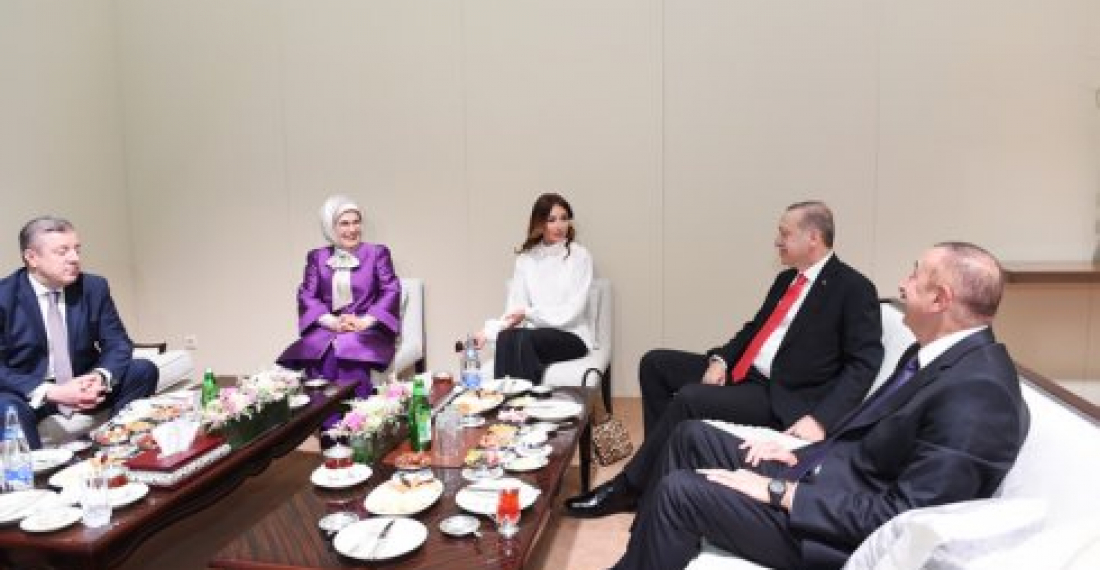The recently launched Baku-Tbilisi-Kars railway link is a good example of the thriving trilateral co-operation between Azerbaijan, Georgia and Turkey says Emil Avdaliani in this op-ed. The trilateral format, underpinned by various large regional projects, has proved to be durable.
On October 30th the Azerbaijani President Ilham Aliyev hosted his Turkish counterpart Recep Tayyip Erdogan, as well as the Georgian prime minister, Giorgi Kvrikashvili, attended a ceremony to launch the first train on the newly built Baku-Tbilisi-Kars railway stretching from the Caspian Sea port of Alat, south of the Azeri capital, Baku to the city of Kars in eastern Turkey. The ceremony was also attended by the prime ministers of Kazakhstan and Uzbekistan.
The new project will play an important role in the geopolitics of the region as it will not only increase connectivity in the South Caucasus, but potentially could also embolden the land-locked Central Asian states to think about increasing their gas and oil exports to the European markets. The project opens a rail corridor connecting Central Asia with the European markets, through the South Caucasus region. This is also reflected in the intention behind the construction of the port at Alat in Azerbaijan, which is one of the largest in the Caspian Sea region, and which was specifically built to provide connections to Central Asia.
An additional layer of geopolitical importance is added to the project when it is seen within the context of the Chinese One Belt and One Road Initiative (OBOR). The 826-kilometer railway will enable the delivery of cargo between China and Europe in approximately two weeks. Up to 8 million tons of cargo may be carried on the Baku-Tbilisi-Kars railway by 2025.
The opening of the railway underpins the increasing Turkey-Georgia-Azerbaijan partnership. This trilateral format was launched in Batumi (Georgia) in May 2012. Since then defence and economic co-operation between the three countries increased, and we witnessed numerous joint military exercises between their armies. Furthermore, the countries also co-operate on the exchange of military staff and military expertise.
The durability of this strategic partnership is underpinned by the three countries need of each other. Nascent military co-operation, along with important railways and pipelines, represents a sticking point for Ankara, Georgia, and Azerbaijan.
Considering how shaky the regional, political and security landscape in the South Caucasus and the Black Sea is, co-operation between the three countries is certainly important. The trilateral relationship is noteworthy as is consists of NATO member Turkey, EU/NATO-oriented Georgia, and Azerbaijan which, up until now, has avoided joining any large economic or military alliances.
However, despite the three countries' evidently divergent strategic paths, the basis for trilateral co-operation has only increased. Every one of the three countries needs the other two. Turkey wants a more stable Georgia, with deeper economic and energy relations, while Azerbaijan, in the light of uncertainties regarding Nagorno-Karabakh, needs Turkey's backing. Georgia, in-between, under pressure from Russia and being dependent on transit, in turn, needs both Turkey and Azerbaijan. Moreover, the two countries are Tbilisi's biggest trade partners and investment sources and Georgia is an essential component for the transit of energy supplies from the Caspian Sea to the global markets, bypassing Russia
All the three countries see how interdependent they are, and there are clear imperatives (internal problems, foreign pressure) to increase the co-operation within this format. In other words, energy and transport infrastructure tying the three states, such as the Baku-Tbilisi-Ceyhan pipeline and the Baku-Tbilisi-Akhalkalaki-Kars railway take precedence.
This geopolitical thinking has been central to the Turkey-Georgia-Azerbaijan co-operation. True, the countries still lack a common agenda on how to further develop their military co-operation, and there are not yet any concrete mechanisms on how to deal with foreign policy challenges, but the trilateral format underpinned by various large regional projects nevertheless has proved to be durable.
Thus, despite the much-improved Turkey-Russia relations, and at times some minor disagreements between Turkey, Georgia, and Azerbaijan, there are no concrete developments suggesting that this will negatively impact the existing relations between Turkey, Georgia, and Azerbaijan either bilaterally, or in the trilateral format. In fact, the opening of the Baku-Tbilisi-Kars railway suggests that co-operation between the three countries is increasing, regardless of how volatile the region generally is. This makes it also quite likely that, based on geopolitical imperatives, Turkey, Georgia and Azerbaijan will work to further entrench their mutual engagement.
source: Emil Avdaliani teaches history and international relations at Tbilisi State University and Ilia State University. He contributed this op-ed for commonspace.eu
photo: The Presidents of Azerbaijan and turkey and the Prime Mintser of georgia chatting before the launch of the first train on the newly built Baku-Tbilisi-Kars rail link. Also in the picture are the spouses of the Turkish and Azerbaijani leaders. (picture courtesy of the press service of the president of Azerbaijan).






